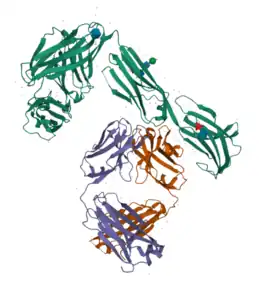 Emactuzumab light (purple) and heavy (orange) chains complexed with CSF-1R (green) | |
| Monoclonal antibody | |
|---|---|
| Type | Whole antibody |
| Source | Humanized (from mouse) |
| Target | CSF1R |
| Clinical data | |
| Other names | RG7155, RO5509554 |
| Routes of administration | intravenous infusion |
| ATC code |
|
| Pharmacokinetic data | |
| Elimination half-life | 1.5 - 9 days |
| Identifiers | |
| CAS Number | |
| DrugBank | |
| UNII | |
| KEGG | |
| Chemical and physical data | |
| Formula | C6398H9908N1704O2020S44 |
| Molar mass | 144430.19 g·mol−1 |
Emactuzumab[1] (RG-7155) is a humanized monoclonal antibody directed against colony stimulating factor 1 receptor (CSF-1R) expressed on macrophages[2][3] and has demonstrated a profound antitumor effect through interference with the CSF-1/CSF-1R axis, along with a manageable safety profile in patients with diffuse-type tenosynovial giant cell tumors (d-TGCT).[4]
History
Emactuzumab was originally developed by Roche/Genentech. In August 2020, Celleron Therapeutics signed a deal to acquire an exclusive worldwide license for the asset.[5] In November 2020, Celleron Therapeutics incorporated a subsidiary, SynOx Therapeutics, to focus on the development, registration, and commercialisation of emactuzumab.[6]
Mechanism of action
Emactuzumab is a humanized monoclonal antibody directed against the tyrosine kinase receptor colony stimulating factor 1 receptor (CSF1R; CSF-1R; CD115), also known as macrophage colony-stimulating factor receptor (M-CSFR), with potential antineoplastic and immunomodulating activities. Upon administration, emactuzumab binds to CSF1R expressed on macrophages and inhibits the binding of colony-stimulating factor-1 (CSF-1) to CSF1R. This prevents CSF1R activation and CSF1R-mediated signaling in these cells, which blocks the production of inflammatory mediators by macrophages and reduces inflammation. By blocking both the activity of CSF1R-dependent tumor-associated macrophages (TAMs) and the recruitment of TAMs to the tumor microenvironment, emactuzumab enhances T-cell infiltration and antitumor T-cell immune responses, which inhibits the proliferation of tumor cells. TAMs play key roles in immune suppression and promoting inflammation, tumor cell proliferation and survival.[7]
Clinical efficacy
In a Phase Ib clinical study, biopsies were taken from TGCT subjects before and on emactuzumab treatment, and immunohistochemistry was performed with antibodies against CD68/CD163 (biomarkers for TAMs) and CSF-1R. Altogether, 36 patients (57%) had evaluable paired tumour biopsy samples (taken at baseline and on treatment at four weeks, after two cycles of emactuzumab at doses of 900 – 2000 mg). A significant reduction of >50% of CD68/CD163-positive macrophages and CSF1R-positive macrophages was seen in 22 patients (61%), showing that the neutralisation of CSF-1R by emactuzumab resulted in the concomitant depletion of TAMs. In the efficacy cohort, 45 of 63 patients (71%) had a best overall response of complete response or partial response (PR) and the disease control rate was 98% (62 of 63 patients). None of the patients were assessed with progressive disease at the time of treatment discontinuation, although the majority of patients (39 patients [62%]) only received a limited number of four or five treatment cycles. After one- and two-year follow-up MRI, 19/27 patients (70%) and 9/14 patients (64%), respectively, were still in response at these time points.[8]
References
- ↑ World Health Organization (2014). "International Nonproprietary Names for Pharmaceutical Substances (INN). Proposed INN: List 111" (PDF). WHO Drug Information. 28 (2).
- ↑ Ries CH, Cannarile MA, Hoves S, Benz J, Wartha K, Runza V, et al. (June 2014). "Targeting tumor-associated macrophages with anti-CSF-1R antibody reveals a strategy for cancer therapy". Cancer Cell. 25 (6): 846–859. doi:10.1016/j.ccr.2014.05.016. PMID 24898549.
- ↑ Ries CH, Hoves S, Cannarile MA, Rüttinger D (August 2015). "CSF-1/CSF-1R targeting agents in clinical development for cancer therapy". Current Opinion in Pharmacology. 23: 45–51. doi:10.1016/j.coph.2015.05.008. PMID 26051995.
- ↑ Cassier PA, Italiano A, Gomez-Roca CA, Le Tourneau C, Toulmonde M, Cannarile MA, et al. (August 2015). "CSF1R inhibition with emactuzumab in locally advanced diffuse-type tenosynovial giant cell tumours of the soft tissue: a dose-escalation and dose-expansion phase 1 study". The Lancet. Oncology. 16 (8): 949–956. doi:10.1016/S1470-2045(15)00132-1. PMID 26179200.
- ↑ "Roche offloads clinical-phase cancer drug to Celleron". FierceBiotech.
- ↑ "SynOx Therapeutics raises €37M in Series A Financing". Cision PR Newswire.
- ↑ "NCI Drug Dictionary: Emactuzumab". NCI Drug Dictionary. U.S. Department of Health and Human Services, National Institutes of Health, National Cancer Institute (NCI). 2011-02-02.
- ↑ Cassier PA, Italiano A, Gomez-Roca C, Le Tourneau C, Toulmonde M, D'Angelo SP, et al. (December 2020). "Long-term clinical activity, safety and patient-reported quality of life for emactuzumab-treated patients with diffuse-type tenosynovial giant-cell tumour". European Journal of Cancer. 141: 162–170. doi:10.1016/j.ejca.2020.09.038. PMID 33161240.